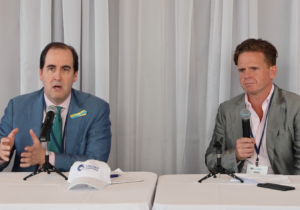
- Gildan Activewear Inc. (TSX and NYSE: GIL), owner of American Apparel, fired Co-Founder and CEO Glenn Chamandy in shock to many shareholders
- Long-only investment fund Browning West LP owns 5% of shares and wants CEO reinstated
- Approximately 35% of shareholder base, a total of 9 investment funds, have publicly voiced desire to reinstate Mr. Chamandy
- Browning West also nominated slate of 8 directors ahead of annual meeting, enough to secure majority control if victorious
- Gildan hasn’t reinstated Mr. Chamandy and new CEO formally started Jan. 15, nearly a month ahead of original plan
- Gildan says Mr. Chamandy has “no long-term strategy or vision” after Chairman just months earlier boasted of strong performance and growth opportunities
- Profits have surged in recent years and analysts expect continued growth in 2024 and 2025
- Gildan shareholders saw 9,779% total return between 1998 IPO and Mr. Chamandy’s last day, according to Bloomberg data
- Gildan has resorted to several shareholder-unfriendly tactics to deflect criticism, likely racking up heavy advisory fees
By John Jannarone and Karen E. Roman
Gildan Activewear Inc. (TSX and NYSE: GIL), public since 1998, is one of Canada’s greatest success stories. Unfortunately, its board recently turned the narrative in a darker direction, potentially creating a poster child for failed corporate governance.
Last December, Gildan shocked many shareholders after the board fired Co-Founder and CEO Glenn Chamandy, who started the company 40 years ago. Long-only investment fund Browning West LP, which has been an investor since 2017 without selling any shares and currently owns 5% of Gildan, issued a press release just a few days later criticizing the board’s actions. In coming weeks, another eight investors also said they support Mr. Chamandy’s return, with roughly 35% of the shareholder base making their positions on the matter known publicly.
Those other shareholders include Turtle Creek Asset Management, Jarislowsky Fraser Ltd, Cooke & Bieler LP, Pzena Investment Management, LLC, Janus Henderson, Cardinal Capital Management, Oakcliff Capital, along with Anson Funds Management/Anson Advisors Inc. CorpGov reached out individually to all nine investors, all of whom either declined to comment or didn’t reply. Gildan didn’t respond immediately to a request for comment.
After several weeks, Browning West named its own slate of eight directors who will be up for vote in May. If those directors were all to win, it would result in majority control of the board.

Advisors not involved in the situation say it’s extremely unusual to see such a high level of public shareholder dissatisfaction. That is especially true because the investors who oppose the CEO ouster are rarely if ever activist investors, so they typically wouldn’t make public statements at all. Indeed, the 35% figure likely doesn’t reflect the true amount of support because other investors may have hesitated to express their views. (To be clear, not all of the vocal investors have said explicitly they support Browning West’s slate, but it stands to reason many if not all of them would given their vocal opposition to the CEO ouster).
“Unless you know with a high degree of certainty that the overwhelming majority of rest of the shareholder base wants something different, it is unclear why a board wouldn’t try to get a deal done,” said Lawrence Elbaum, Partner and Co-Head of Shareholder Activism at Vinson & Elkins LLP. “At a minimum you should be able to say you tried.”
Mr. Elbaum added that roughly 75% to 85% of any given shareholder base votes at annual meetings, indicating that shareholders publicly supporting Mr. Chamandy may already account for nearly half of the votes that will be cast.
Regardless, the board has poured serious resources into pushing back against the unhappy shareholders, raising questions about how it approaches corporate governance. First, it failed to hold a special meeting in January as Browning West requested, effectively delaying any resolution of the matter until late May. It also put the new CEO, Vince Tyra, at the helm almost a month early despite shareholder opposition. It has filed a lawsuit against Browning West and sent “threatening” letters to other shareholders who want Mr. Chamandy back, according to Browning West.
The fight is likely already costing Gildan shareholders big money. Companies waging a fight against shareholders usually hire a bevy of pricey advisors including bankers, attorneys, proxy solicitors and strategic communications experts who can easily result in a multimillion dollar bill.

The board’s rationale for firing Mr. Chamandy is also confusing. The company said he has “no long-term strategy or vision” which is directly at odds with statements made just months earlier. In February last year, Chairman Donald Berg wrote in a letter to shareholders that “we are pleased with our strong performance…placing us in a position of strength to capitalize on future growth opportunities.” There’s been evidence of such success in profits: Adjusted Ebitda was $548 million in 2019 before the pandemic, with consensus estimates for $765 million this year, a 40% increase, according to Sentieo, an AI-enabled research platform.
And longer term, it’s hard to argue that Mr. Chamandy has disappointed investors. Gildan shareholders have seen a 9,779% total return, assuming dividends were reinvested, between the company’s IPO and Dec. 8, 2023, according to Bloomberg data.

The new CEO appointed by the board, Vince Tyra, has had an industry track record that’s mixed at best. His most relevant industry experience arguably dates back a couple of decades, when he was part of senior leadership at two companies that faced major struggles. From 1997 to 2000, he worked at Fruit of the Loom, Inc. where he was President when the company filed for bankruptcy. From 2000 to 2005, he was CEO of Broder Bros., which narrowly avoided bankruptcy and instead was forced into restructuring a few years later. More recently, he was Director of Athletics at the University of Louisville from 2017 to 2021 followed by less than two years in an SVP role at
With more than three months to go before the annual meeting, it remains unclear what outcome Gildan expects. “The board may wind up fighting like Tony Montana at the end of Scarface,” Mr. Elbaum said. “We all know what happens to Tony Montana.”
Contact:
Editor@CorpGov.com





